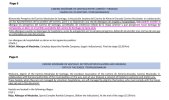Laura the Explora
Member
- Time of past OR future Camino
- Via Podiensis and Camino Frances 2023
My husband and I are on our 7th Camino right now, the sparsely traveled Camino Mozarabe in SE Spain. Groups of volunteers run the different sections of the Camino and give you codes and things like that to get into the albergues since there are rarely Hospitaleros. The volunteers been helpful and welcoming to us.
We met 2 young women along they way on their break from medical school walking it backwards because it worked a lot better for them logistically to go from Cordoba to Almeria instead of the other way around. One of them has down the Norte. They have their pilgrim passports, are carrying their things, and have gotten stamps from every section up to the section after Granada.
From Cordoba to Granada, they were fine. Then once they got past Granada, a new group of volunteers took over and told them they were not allowed to stay in the albergues because they are not real pilgrims and just sightseeing tourists since they aren’t walking toward Santiago since a pilgrimage is to a sacred place.
So what makes a pilgrim? Many people have opinions on this: “You’re not a real pilgrim if….” Insert what you want: don’t carry your bag. Don’t sleep in albergues. Skip sections. Have tour groups plan their Camino. Etc. You name it, and people have an opinion on it. But they don’t get turned away from albergues.
But I have never heard of people being denied a bed (keep in mind, this is a lonely, hard Camino through the desert) because they are walking east instead of west. I understand it’s their facilities, and I suppose they can do what they want (?) but this is absolutely against the spirit of the Camino in my opinion.
I don’t know what to do about this, but I feel like this group of volunteers is a bit holier than though in their interpretation of what makes a pilgrim.
I’m quite upset about these women being treated this way. Thoughts?
We met 2 young women along they way on their break from medical school walking it backwards because it worked a lot better for them logistically to go from Cordoba to Almeria instead of the other way around. One of them has down the Norte. They have their pilgrim passports, are carrying their things, and have gotten stamps from every section up to the section after Granada.
From Cordoba to Granada, they were fine. Then once they got past Granada, a new group of volunteers took over and told them they were not allowed to stay in the albergues because they are not real pilgrims and just sightseeing tourists since they aren’t walking toward Santiago since a pilgrimage is to a sacred place.
So what makes a pilgrim? Many people have opinions on this: “You’re not a real pilgrim if….” Insert what you want: don’t carry your bag. Don’t sleep in albergues. Skip sections. Have tour groups plan their Camino. Etc. You name it, and people have an opinion on it. But they don’t get turned away from albergues.
But I have never heard of people being denied a bed (keep in mind, this is a lonely, hard Camino through the desert) because they are walking east instead of west. I understand it’s their facilities, and I suppose they can do what they want (?) but this is absolutely against the spirit of the Camino in my opinion.
I don’t know what to do about this, but I feel like this group of volunteers is a bit holier than though in their interpretation of what makes a pilgrim.
I’m quite upset about these women being treated this way. Thoughts?


























